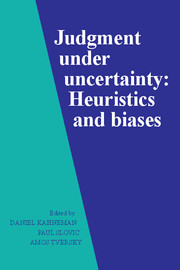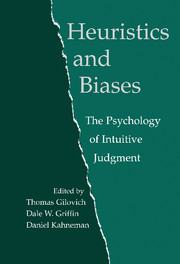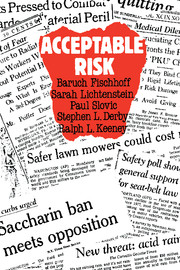
The Construction of Preference
£104.00
- Editors:
- Sarah Lichtenstein, Decision Research. Oregon
- Paul Slovic, Decision Research, Oregon
- Date Published: November 2006
- availability: Available
- format: Hardback
- isbn: 9780521834285
£
104.00
Hardback
Other available formats:
Paperback, eBook
Looking for an inspection copy?
This title is not currently available on inspection
-
One of the main themes that has emerged from behavioral decision research during the past three decades is the view that people's preferences are often constructed in the process of elicitation. This idea is derived from studies demonstrating that normatively equivalent methods of elicitation (e.g., choice and pricing) give rise to systematically different responses. These preference reversals violate the principle of procedure invariance that is fundamental to all theories of rational choice. If different elicitation procedures produce different orderings of options, how can preferences be defined and in what sense do they exist? This book shows not only the historical roots of preference construction but also the blossoming of the concept within psychology, law, marketing, philosophy, environmental policy, and economics. Decision making is now understood to be a highly contingent form of information processing, sensitive to task complexity, time pressure, response mode, framing, reference points, and other contextual factors.
Read more- Over thirty papers describing the concept of preference construction
- Will interest a diverse audience of readers in social and cognitive psychology and economics
- The research and new theories of decision making will have strong implications for how we - and our government - should make decisions
Customer reviews
Not yet reviewed
Be the first to review
Review was not posted due to profanity
×Product details
- Date Published: November 2006
- format: Hardback
- isbn: 9780521834285
- length: 810 pages
- dimensions: 234 x 156 x 43 mm
- weight: 1.3kg
- contains: 62 tables
- availability: Available
Table of Contents
Part I. Introduction: Preface
Acknowledgements
1. The construction of preference: an overview
Part II. Preference Reversals:
2. Relative importance of probabilities and payoffs in risk taking
3. Reversals of preference between bids and choices in gambling decisions
4. Response-induced reversals of preference in gambling: an extended replication in Las Vegas
5. Economic theory of choice and the preference reversal phenomenon
Part III. Psychological Theories of Preference Reversals:
6. Contingent weighting in judgment and choice
7. Cognitive processes in preference reversals
8. The causes of preference reversal
9. Preference reversals between joint and separate evaluations of options: a review and theoretical analysis
10. Attribute-task compatibility as a determinant of consumer preference reversals
11. Preferences constructed from dynamic micro-processing mechanisms
Part IV. Evidence for Preference Construction:
12. Construction of preferences by constraint satisfaction
13. Coherent arbitrariness: stable demand curves without stable preferences
14. Tom Sawyer and the construction of value
15. When Web pages influence choice: effects of visual primes on experts and novices
16. When choice is demotivating: can one desire too much of a good thing?
Part V. Theories of Preference Construction:
17. Constructive consumer choice processes
18. Decision making and action: the search for a dominance structure
19. Pre- and post-decision construction of preferences: differentiation and consolidation
20. Choice bracketing
21. Constructing preferences from memory
Part VI. Affect and Reason:
22. Reason-based choice
23. The affect heuristic
24. The functions of affect in the construction of preferences
25. Mere exposure: a gateway to the subliminal
26. Introspecting about reasons can reduce post-choice satisfaction
Part VII. Miswanting:
27. New challenges to the rationality assumption
28. Distinction bias: misprediction and mischoice due to joint evaluation
29. Lay rationalism and inconsistency between predicted experience and decision
30. Miswanting: some problems in the forecasting of future affective states
Part VIII. Contingent Valuation:
31. Economic preferences or attitude expressions?: an analysis of dollar responses to public issues
32. Music, pandas, and muggers: on the affective psychology of value
33. Valuing environmental resources: a constructive approach
Part IX. Preference Management:
34. Measuring constructed preferences: towards a building code
35. Constructing preferences from labile values
36. Informed consent and the construction of values
37. Do defaults save lives?
38. Libertarian paternalism is not an oxymoron
References
Index.Instructors have used or reviewed this title for the following courses
- Psychology and Public Policy
Sorry, this resource is locked
Please register or sign in to request access. If you are having problems accessing these resources please email [email protected]
Register Sign in» Proceed
You are now leaving the Cambridge University Press website. Your eBook purchase and download will be completed by our partner www.ebooks.com. Please see the permission section of the www.ebooks.com catalogue page for details of the print & copy limits on our eBooks.
Continue ×Are you sure you want to delete your account?
This cannot be undone.
Thank you for your feedback which will help us improve our service.
If you requested a response, we will make sure to get back to you shortly.
×





